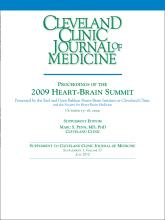ABSTRACT
Biofeedback training can be used to reduce activation of the sympathetic nervous system (SNS) and increase activation of the parasympathetic nervous system (PNS). It is well established that hyperactivation of the SNS contributes to disease progression in chronic heart failure. It has been postulated that underactivation of the PNS may also play a role in heart failure pathophysiology. In addition to autonomic imbalance, a chronic inflammatory process is now recognized as being involved in heart failure progression, and recent work has established that activation of the inflammatory process may be attenuated by vagal nerve stimulation. By interfering with both autonomic imbalance and the inflammatory process, biofeedback-assisted stress management may be an effective treatment for patients with heart failure by improving clinical status and quality of life. Recent studies have suggested that biofeedback and stress management have a positive impact in patients with chronic heart failure, and patients with higher perceived control over their disease have been shown to have better quality of life. Our ongoing study of biofeedback-assisted stress management in the treatment of end-stage heart failure will also examine biologic end points in treated patients at the time of heart transplant, in order to assess the effects of biofeedback training on the cellular and molecular components of the failing heart. We hypothesize that the effects of biofeedback training will extend to remodeling the failing human heart, in addition to improving quality of life.
- © 2010 The Cleveland Clinic Foundation. All Rights Reserved.






